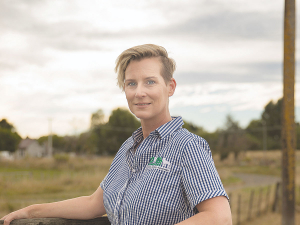Sheep Measles Spike: Farmers urged to strengthen control measures
Farmers are being urged to keep on top of measures to control Cysticerus ovis - or sheep measles - following a spike in infection rates.
 Michelle Simpson believe an important part of her role is helping spread the word about Ovis and that everyone has a part to play in protecting the sheep meat market.
Michelle Simpson believe an important part of her role is helping spread the word about Ovis and that everyone has a part to play in protecting the sheep meat market.
The Ovis Management programme, which works to promote control of sheep measles across New Zealand, has appointed a new project manager.
Michelle Simpson replaces Dan Lynch, who has retired after heading the programme for 28 years.
Simpson has a background in laboratory science, was formerly manager of the large animal department for Southern Rangitikei Veterinary Service and is married to a sheep and beef farmer. They live in Halcombe in the Manawatū.
"Sheep measles poses no risk to human health but causes blemishes in sheep meat, which is undesirable for consumers - particularly for the export market," she explains.
"It costs farmers a lot of money due to condemned stock, so it is an important issue for the primary sector."
C. ovis (sheep measles) is caused by the Taenia ovis tapeworm. Dogs can become infected by eating untreated meat or offal infected with live cysts. It is then spread to sheep through tapeworm eggs in dog faeces left in grazing areas. Eggs can also be spread from dog faeces over large areas, predominantly by flies.
The best practice for dog health and sheep measles is for all farm dogs to be treated with cestocidal (tapeworm) drugs containing the ingredient Praziquantel - a cheap and effective treatment - and an All Wormer every three months.
"A frequent issue with Ovis is that if a farmer is not sending in lambs for procesing, they may not know that they are passing the problem on," Simpson says. "Then, when a farmer ends up with issues with their product, they don't know who to turn to."
She believes that an important part of her role is helping those farmers to spread the word, that everyone has a part to play in protecting the sheep meat market.
"It is important to get the message out there that all dog owners who take their dogs near farmland, or where sheep graze, must dose their dogs every month."
Simpson says this is essential because the tapeworm has a short life cycle and dosing three-monthly is not enough to stop the parasite from spreading.
"Farmers and landowners can control who is coming onto their property with their dogs. It's your land, your livelihood, and your rules and if a dog does not need to come onto the property, then it is best not to have it there."
Simpson says she will be working with urban vet clinics, as well as rural ones, to further raise awareness of the importance of dosing dogs before they go into rural areas.
"Most urban dog owners are unlikely to know about the risk of Ovis, so it's about getting the message out that we all have a part to play."
The World Wide Sires National All Day Breeds Best Youth Camp Best All Rounder plaudit has become family affair, with 2026 Paramount Cup winner Holly Williams following in her sister Zara's footsteps.
DairyNZ is giving New Zealand farmers a unique opportunity to gain hands-on governance and leadership experience within the dairy sector.
Herd improvement company LIC has posted a 5.2% lift in half-year revenue, thanks to increasing demand for genetics.
According to the latest Fresh Produce Trend Report from United Fresh, 2026 will be a year where fruit and vegetables are shaped by cost pressures, rapid digital adoption, and a renewed focus on wellbeing at home.
The Roar is a highlight of the game hunting calendar in New Zealand, with thousands of hunters set to head for the hills to hunt male stags during March and April.
OPINION: The past few weeks have been tough on farms across the North Island: floods and storms have caused damage and disruption to families and businesses.